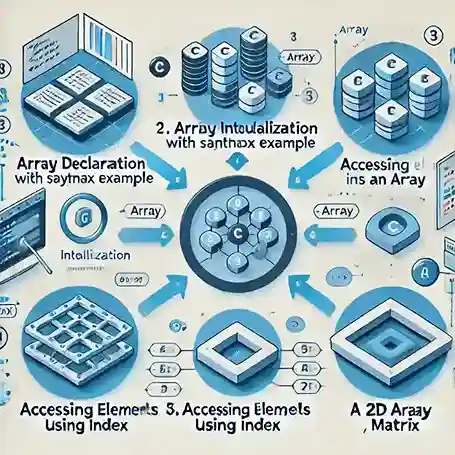Introduction to Arrays in c language
C programming array declaration syntax example #Introduction to Arrays in C #Arrays in c language
Introduction to Arrays in C
An array in C programming is a fundamental data structure that stores multiple values of the same data type under a single variable name. Arrays help in efficient data management and processing, making them an essential concept in C programming.

What is an Array in C?
An array is a collection of elements stored in contiguous memory locations. Each element is accessed using an index, starting from 0. Arrays in C improve efficiency by enabling fast data retrieval and manipulation.
Key Features of Arrays in C:
- Stores multiple elements of the same data type
- Contiguous memory allocation for efficient data access
- Indexed elements, starting from 0
- Fixed size determined at the time of declaration
Declaring an Array in C
To use an array, it must be declared with a specified data type and size:
int numbers[10]; // Declares an array of 10 integers
Initializing an Array in C
Arrays can be initialized in multiple ways:
1. During Declaration:
int numbers[5] = {1, 2, 3, 4, 5};
2. Using Index-Based Assignment:
numbers[0] = 1;
numbers[1] = 2;
Accessing Elements in an Array
Array elements are accessed using their index:
int thirdElement = numbers[2]; // Accessing the third element
Finding the Size of an Array
To determine the size of an array dynamically:
int size = sizeof(numbers) / sizeof(numbers[0]);
Iterating Over an Array
Loops are commonly used to iterate through an array:
for (int i = 0; i < 5; ++i) {
printf("%d ", numbers[i]);
}
Multidimensional Arrays in C
C supports multidimensional arrays, such as 2D arrays (matrices):
int matrix[3][4] = {
{1, 2, 3, 4},
{5, 6, 7, 8},
{9, 10, 11, 12}
};
Advantages of Using Arrays in C
- Efficient memory utilization
- Faster access to elements using indexes
- Useful for storing large data sets
- Simplifies handling of structured data
Conclusion
Arrays are a crucial part of C programming that enhance efficiency and organization when handling multiple values of the same type. Understanding how to declare, initialize, and iterate through arrays will help in optimizing performance and writing structured code.
For more C programming tutorials, stay updated with our latest posts!
Table of content
- Introduction to C Programming
- Control Flow Statements
- Arrays and Strings
- Structures and Unions
- Pointers and Memory Management
- Programs and Practical Examples